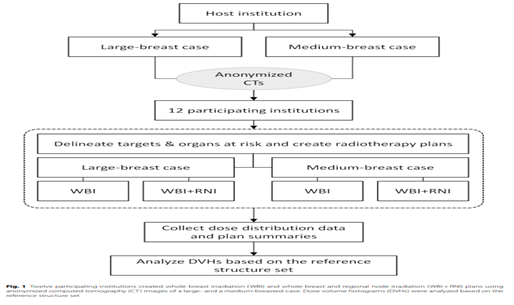글로벌 연구동향
방사선종양학
- 2023년 01월호
[Radiat Oncol .] Dummy run quality assurance study in the Korean Radiation Oncology Group 19 - 09 multi-institutional prospective cohort study of breast cancer국립암센터 / 김명수, 박보람, 김학수*, 김연주*
- 출처
- Radiat Oncol .
- 등재일
- 2022 Nov 16
- 저널이슈번호
- 17(1):186. doi: 10.1186/s13014-022-02140-0.
- 내용
Abstract
Background: The Korean Radiation Oncology Group (KROG) 19 - 09 prospective cohort study aims to determine the effect of regional nodal irradiation on regional recurrence rates in ypN0 breast cancer patients. Dosimetric variations between radiotherapy (RT) plans of participating institutions may affect the clinical outcome of the study. We performed this study to assess inter-institutional dosimetric variations by dummy run.Methods: Twelve participating institutions created RT plans for four clinical scenarios using computed tomography images of two dummy cases. Based on a reference structure set, we analyzed dose-volume histograms after collecting the RT plans.
Results: We found variations in dose distribution between institutions, especially in the regional nodal areas. Whole breast and regional nodal irradiation (WBI + RNI) plans had lower inter-institutional agreement and similarity for 95% isodose lines than WBI plans. Fleiss's kappa values, which were used to measure inter-institutional agreement for the 95% isodose lines, were 0.830 and 0.767 for the large and medium breast WBI plans, respectively, and 0.731 and 0.679 for the large and medium breast WBI + RNI plans, respectively. There were outliers in minimum dose delivered to 95% of the structure (D95%) of axillary level 1 among WBI plans and in D95% of the interpectoral region and axillary level 4 among WBI + RNI plans.
Conclusion: We found inter-institutional and inter-case variations in radiation dose delivered to target volumes and organs at risk. As KROG 19 - 09 is a prospective cohort study, we accepted the dosimetric variation among the different institutions. Actual patient RT plan data should be collected to achieve reliable KROG 19 - 09 study results.

Affiliations
Myeongsoo Kim # 1, Boram Park # 2, Haksoo Kim 3, Yeon-Joo Kim 4 5, Dong Ju Choi 1, Weonkuu Chung 6, Yeon Joo Kim 7, Hyun Soo Shin 8, Jung Ho Im 8, Chang-Ok Suh 8, Jin Hee Kim 9, Boram Ha 10, Mi Young Kim 11, Jongmoo Park 12, Jeongshim Lee 13, Sung-Ja Ahn 14, Sun Young Lee 15, Grace Kusumawidjaja 16, Faye Lim 16, Won Kyung Cho 17, Haeyoung Kim 17, Doo Ho Choi 17, Won Park 17
1Department of Radiation Oncology, National Cancer Center, Goyang, Korea.
2Biomedical Statistics Center, Samsung Medical Center, Seoul, Korea.
3Department of Radiation Oncology, National Cancer Center, Goyang, Korea. haksoo.kim@ncc.re.kr.
4Department of Radiation Oncology, National Cancer Center, Goyang, Korea. yjkim1785@ncc.re.kr.
5Proton Therapy Center, National Cancer Center, 323 Ilsan-ro, Ilsandong-gu, 410-769, Goyang-si, Gyeonggi-do, Republic of Korea. yjkim1785@ncc.re.kr.
6Radiation Oncology Kyung Hee University Hospital at Gangdong, Kyung Hee University School of Medicine, Seoul, Korea.
7Department of Radiation Oncology, Kangwon National University Hospital, Chuncheon, Korea.
8Department of Radiation Oncology, CHA Bundang Medical Center, CHA University, Seongnam, Korea.
9Department of Radiation Oncology, Keimyung University Dongsan Medical Center, Daegu, Korea.
10Department of Radiation Oncology, Hallym University Dongtan Sacred Heart Hospital, Hwaseong, Korea.
11Department of Radiation Oncology, Kyungpook National University Chilgok Hospital, Daegu, Korea.
12Department of Radiation Oncology, School of Medicine, Kyungpook National University, Daegu, Korea.
13Department of Radiation Oncology, Inha University Hospital, Incheon, Korea.
14Department of Radiation Oncology, Chonnam National University Hwasun Hospital, Jeollanam-do, Gwangju, Korea.
15Department of Radiation Oncology, Jeonbuk National University Hospital, Jeonju, Korea.
16Division of Radiation Oncology, National Cancer Centre Singapore, Singapore, Singapore.
17Department of Radiation Oncology, Samsung Medical Center, Sungkyunkwan University School of Medicine, Seoul, Korea.
#Contributed equally.
- 키워드
- Breast neoplasms; Dosimetric variations; Dummy run; Quality assurance; Radiotherapy.
- 덧글달기







